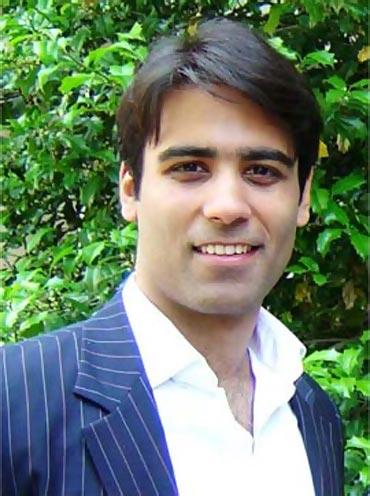 | « Back to article | Print this article |
I'd like to be remembered as a great entrepreneur: Divya Narendra
Divya Narendra, the 29-year-old, American Indian who along with the Winklevoss brothers has filed a lawsuit against Facebook for copying their idea, seems to have moved on in life.
While the lawsuit against Facebook remains work in progress, Divya is now busy with his new venture. No prizes for guessing that his latest tech-enabled start-up, SumZero, is based on a business model that has an element of social networking to it.
However, SumZero is much more than just social networking, says Divya.
In an e-mail interview with rediff.com Divya speaks about his latest venture, his idols and ideals in life, the lessons he learnt from the Facebook episode and the traps that start-ups should watch out for.
You are only 29 now. After a stint as a hedge fund analyst and somebody who's responsible for the fundamental idea behind Facebook you are already on to your next venture SumZero. What drives you at this stage in your life?
I want a career that allows me to make an impact. Running a tech-enabled start-up gives me a way to make that impact happen and also keeps me close to innovation which I greatly enjoy.
Tell us something about SumZero... it's revenue model and how you plan to monetise the concept.
I can't discuss this in great detail but broadly speaking, we are contemplating a subscription model as a basis for monetisation.
It is reported that SumZero combines the best of Wikipedia and LinkedIn... Your comments
SumZero is both a social network a la LinkedIn, and a user-generated research repository much like Wikipedia. Of course, SumZero (unlike LinkedIn and Wikipedia) is highly tailored for professional hedge fund and mutual fund analysts, and as such, has a much higher barrier to entry (we vet out and approve all members individually).
How would you like to be remembered: As somebody who took on the might of Facebook or somebody who rose above the issue and created value for himself as well as for the community that he served?
Among other things, I'd like to be remembered as a great entrepreneur. I hope one day the success of SumZero overshadows the story of ConnectU.
While you have reportedly said that your lawsuit against Facebook has nothing to do with money, Goldman Sachs has valued Facebook at a whopping $ 50 billion. How much of the pie do you think should rightfully come to you and the Winklevoss brothers?
I can't comment on this.
What did the Facebook experience teach you?
That I should have learned how to web programme in high school ;).
Tell us about the traps that start-up entrepreneurs should not fall into?
There are so many. Trying to do too many things at once without doing any one thing well; being under-capitalised; commitment bias, not having the right founding team with complimentary skill-sets, not completely understanding the competitive landscape (or underestimating the competition), etc.
Your advice to start-ups in India...
My advice would be the same to any start-up, whether in India or elsewhere: Be innovative and focus on providing a service (or good) that makes your customer's life fundamentally better.
The values that help you remain balanced or take right decisions in the face of adversity...
Persistence helps greatly. I think as an entrepreneur in particular, you have to be able to deal with failure (often times repeated failure). Ideally though, you learn from mistakes, and turn yourself around quickly enough to experiment all over again.
I recently heard the Chairman of Groupon speak about the importance of "failing fast" in order to find the right solution quickly which I think sums up this idea well.
Who do you draw inspiration from? Who are your ideals and idols in life?
There are many, but my grandfather, Roger Federer, Warren Buffett, and Steve Jobs immediately come to mind.
Finally, the values that your parents imbibed in you and how have they helped you grow as a human being...
My parents have always been hard working and minimalists in their own right. My dad still drives an old Nissan and my mother works seven days a week. I think I've inculcated a few of these traits which have helped me juggle life's demands -- graduate school, SumZero, and other obligations.
That said, I try not to think about work when I don't have to. I think it's incredibly important to have a social life outside of work to provide balance, and to give you something to look forward to when you leave the office.
